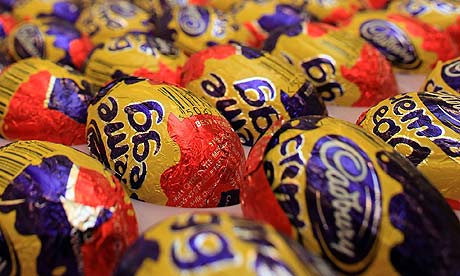
Today's bid is an increase on Kraft's previous offer of around 770p, which Cadbury's chairman had described as 'derisory'. Photograph: Christopher Furlong/Getty Images
Cadbury will accept defeat in its battle to stay independent today by recommending a £12bn takeover from US rival Kraft that threatens to reignite a fierce debate about the vulnerability of British industry.
The 186-year-old chocolate maker decided to throw in the towel late last night after a large foreign shareholder joined hedge funds in indicating it would accept an improved offer from Kraft, and the prospect of a rival bid from Hershey faded. Cadbury's board, led by chairman Roger Carr, will announce its decision to recommend the revised 850p-a-share bid to all shareholders through a statement to the stock exchange this morning, according to sources close to the company.
Although a board recommendation is not binding, it is highly unusual for a company to resist a hostile takeover once its management has capitulated.
The confectionery giant joins a list of British industrial names to have fallen to foreign takeovers in similar circumstances in recent years. More than 50 leading companies have gone, including BAA, Boots, Cazenove, Corus, ICI, Jaguar Land Rover, P&O, Pilkington and Scottish Power.
Until now Cadbury had fought a public campaign to preserve its independence, attracting support from Lord Mandelson, the business secretary, who warned Kraft to expect "huge opposition" from the government if it wanted to make a "fast buck" by buying Cadbury.
His intervention is understood to have rattled Kraft's chief executive, Irene Rosenfeld, who recently met shareholders in London, but the US company chose to negotiate a raised offer after calculating that the political risk was manageable.
Cadbury unions have warned that up to 30,000 jobs would be put at risk by the deal as Kraft would be weighed down by some £22bn in debt. Kraft has a record of aggressive cost-cutting, and the union Unite said that between 2004 and 2008 it shed 19,000 jobs and closed 35 sites to help reduce its debt.
Today's bid of 850p-a-share (including a 10p dividend) is an increase on Kraft's previous offer of around 770p in cash and shares, which Carr had previously described as "derisory". Nonetheless it is at the low end of many independent experts' predictions for an agreed price and comes after Cadbury's chief executive, Todd Spitzer, appeared to suggest he thought its shares were worth £10 each.
A source close to Cadbury said the decision had been taken with "a heavy heart" but followed advice from its investment bankers that any increase in Kraft's bid beyond 830p would succeed.
More than a quarter of Cadbury shares are now in the hands of hedge funds which bought them in the hope of a deal. The final straw came when Franklin Templeton, a large US mutual fund with a 7% stake, indicated it would accept 830p.
The circumstances of the defeat are likely to reopen a debate about the role of hedge funds and other investors during takeovers. Lord Myners, the City minister, has been vocal in his criticism of short-termism among institutional fund managers. Cadbury was the first big test of a supposed new mood after the financial crash and raised strong emotions because of its history as a progressive employer, supporter of fair trade and proponent of good corporate governance.
Nevertheless, its management's actions appear to have followed a well-worn path in such situations. Carr cut his teeth as chief executive of Williams, an industrial conglomerate also sold overseas, and worked with Sir Nigel Rudd, who recommended the sale of Boots two years ago.
Under Takeover Panel rules, Kraft had until midnight tonight to raise its offer. There is still a chance that Hershey may intervene, but sources close to Cadbury last night said that was unlikely.
No comments:
Post a Comment